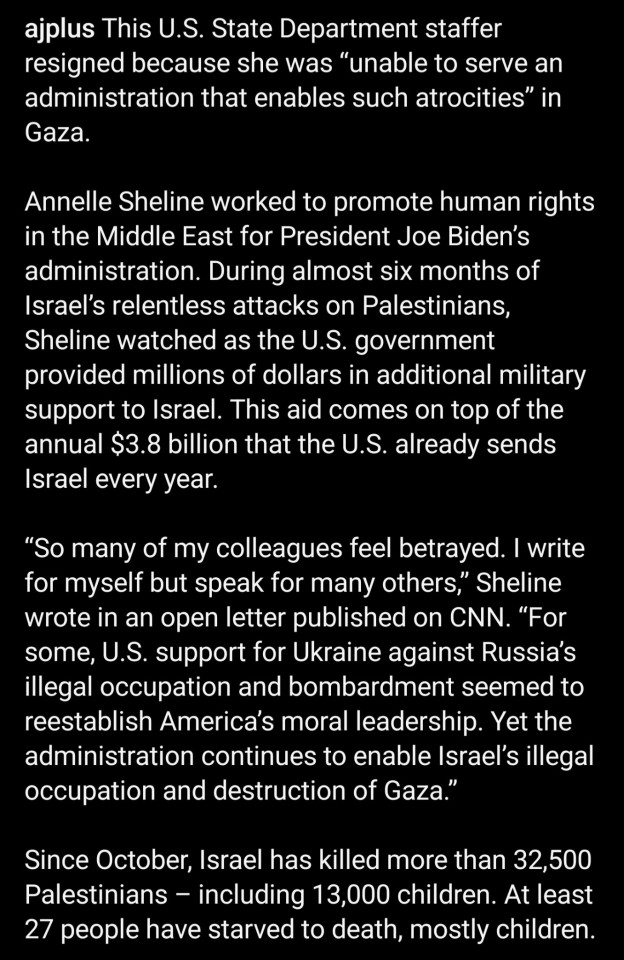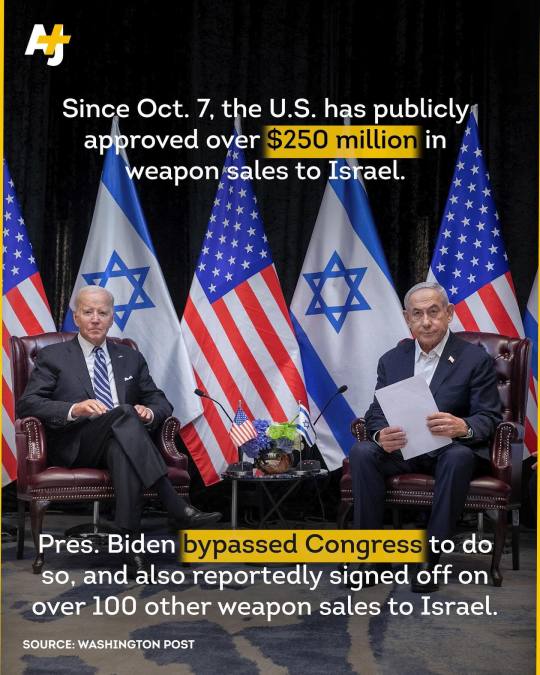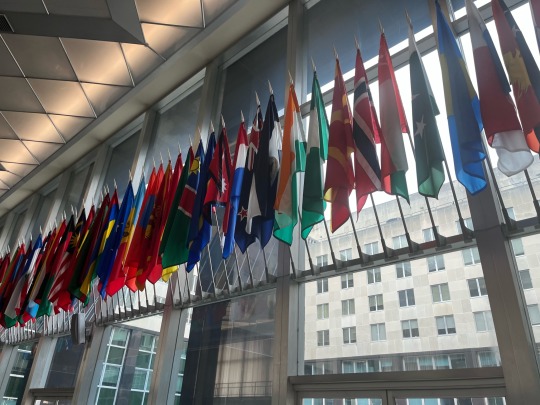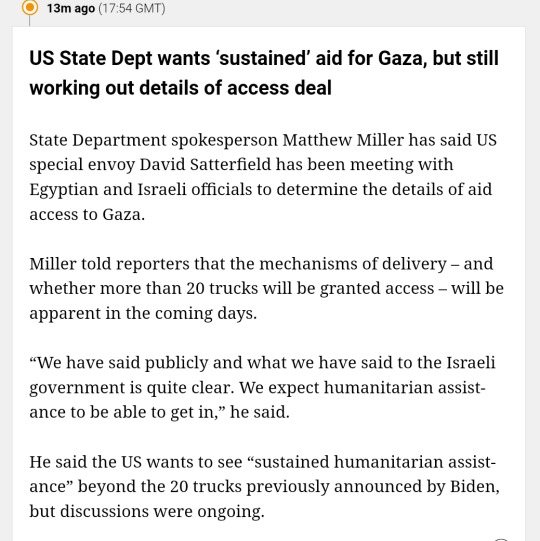#us state department
Text
Fucking hell.
Not again.
It fucking better! Azerbaijan ought to be sanctioned into hell and back again for this shit starting yesterday!
Seriously!
Heck I think we should boycott the shit out of Azerbaijan on top of that!
#dougie rambles#political crap#news#europe#caucasus#armenia#artsakh#free artsakh#azerbaijan#fuck azerbaijan#war crimes#terrorism#genocide#Lemkin institute#raphael lemkin#reblog this#reblog the shit out of this#us state department#sanctions#or lack thereof#boycott Azerbaijan
205 notes
·
View notes
Text

Source
97 notes
·
View notes
Text









#annelle sheline#us state department#another resignation over Palestine#Joe Bye-Done#genocide joe#apartheid#save palestine#ethnic cleansing#israel is an apartheid state#seek truth#free palestine 🇵🇸#genocide#illegal occupation#israel is committing genocide#israeli war crimes#humanitarian crisis#what human rights is the US even pretending to promote?#irony#the US is complicit in genocide war crimes and the starvation of countless innocent Palestinians#the US has zero credibility on the worlds stage and doesnt deserve any#catastrophic hunger#israeli war criminals#israel is a terrorist state#this was NEVER about Hamas#propaganda kills#israeli lies#never again is NOW!#Israel lies while Palestine dies#let Palestine live#stand with palestine
17 notes
·
View notes
Text





This week I had the privilege of visiting the oldest federal library in the country! I got to see some really cool historical documents up close (a chronicle signed by Thomas Jefferson, a pamphlet written by Alexander Hamilton, & George Washington’s personal dictionary) and learn more about the library’s unique, global work. Who says field trips should end after K-12?!
#work#field trip#department of state#us state department#united states#foreign affairs#diplomat#diplomacy#archive#archives#national archives#college#studyblr#study break#study#psychology#neuroscience#books#fellowship#internship#lab#university#school#library#studying#library and information science#book#master of information#art#national history
104 notes
·
View notes
Text

[ 📸 U.S. troops go on patrol at al-Tanf air base in eastern Syria. The Syrian government considers the United States presence in its eastern third as an illegal occupation, and wants U.S. soldiers out of the country.]
🇺🇲⚔️🇸🇾 🪖 🚨
US TO CONSIDER WITHDRAWAL FROM SYRIAN OCCUPATION
The United States is considering a withdrawal of its forces from Syria, according to an article published in Foreign Policy, an online news periodical with ties to the U.S. Defense establishment.
Citing four sources from within the U.S. departments of State and Defense, Foreign Policy claims active internal discussions are ongoing within the Biden administration on a troop withdrawal from Syria, a notoriously illegal occupation of nearly one-third of Syrian territory, which the United States has used to siphon tens of billions of dollars worth of oil out of the country.
The piece was written by senior fellow and director of the Syrian Counterterrorism and Extremism Programs at Middle East Institute, Charles Lister.
The organization itself, the Middle East Institute, is funded by a who's-who of U.S. proxy-governments, Intelligence sources, elite Universities, and giant corporations including Saudi Arabia, the United Arab Emirates, Qatar, Oman, ExxonMobil, George Soros's Open Societies Foundation, Morgan Stanley, and Princeton University.
The article itself presents the decision on the withdrawal of U.S. troops from Syria as an impending disaster, warning that the Islamic State is waiting in the wings for an opportunity to take back control over the Levant, with the title of the published article "America is planning to withdraw from Syria- and create a disaster."
Lister warns that the withdrawal should be "cause for significant concern" and that, while no decision has yet been reached by the Biden administration, the White House is "no longer invested in sustaining a mission that it perceives as unnecessary."
"Notwithstanding the catastrophic effect that a withdrawal would have on U.S. and allied influence over the unresolved and acutely volatile crisis in Syria, it would also be a gift to the Islamic State. While significantly weakened, the group is in fact primed for a resurgence in Syria, if given the space to do so," Lister summerized.
Lister claims that the United States's "unprecedented intervention" launched in 2014 by the Obama administration, alongside "80 partner nations," was "remarkably successful," without ever mentioning Iran's intervention to organize a strong resistance to the Islamic State in Iraq, nor the Russian Intervention to strengthen and reinforce Syria's military and air defenses.
Lister claims the situation in Syria is "more complex" than that of Iraq's, adding that "with approximately 900 troops on the ground, the United States is playing an instrumental role in containing and degrading a persistent Islamic State insurgency in northeastern Syria, working alongside its local partners, the Syrian Democratic Forces (SDF)."
Again, Lister ignores the role played by the Russian military in providing air cover and tactical strikes on behalf of the Syrian military, warning that the threat from IS remains a serious cause for concern.
Lister points to a rocket attack launched against a prison maintained by U.S. proxy-forces to warn of the dangers in Syria, elaborating on the heroic defense of the so-called "Syrian Democratic Forces," comprised of a mix of jihadist groups, some with ties to al-Qaeda, that ran amok, sowing chaos and destabilizing Eastern Syria, until the Russian Intervention in September 2015, when U.S. proxy-forces were largely sequestered into the illegally U.S.-occupied territory in the eastern-most third of Syria.
Lister goes on to raise alarms over the security situation in western Syria too, where Syrian government forces, with the help of the Russian military, have since regained control of much of its territory formally under the control of jihadist groups.
"While U.S. troops and their SDF partners have managed to contain the Islamic State’s recovery in Syria’s northeast, the situation is far more concerning to the west—on the other side of the Euphrates River, where the Syrian regime is in control, at least on paper," Lister claims.
Lister, pushing for the U.S. to remain in Syria, says that "In this vast expanse of desert, the Islamic State has been engaged in a slow but methodical recovery, exploiting regime indifference and its inability to challenge a fluid desert-based insurgency."
Lister's alarmism goes on, describing the supposed regrouping of IS in various government-held regions of Syria, even going so far as to claim that the Islamic State has only been quiet in recent months due to employing a strategy of concealing its operations, never pointing to specific examples that might back those claims.
"For the past several years, the Islamic State has purposely concealed its level of operation in Syria, consistently choosing not to claim responsibility for attacks that it was conducting," the article claims, inversely suggesting the absence of activity by the extremist group is actually evidence of their malfeasance.
Lister also claims that the situation in the Gaza Strip is fueling the groups return, stating that the "war in Gaza and a spiraling regional crises are adding fuel to its fire and creating opportunities for the terror group to exploit the situation for its own advantage," without ever giving any concrete examples of how, where and in what way the group is returning, only citing research from his own shadily-funded organization's projects as evidence.
"According to the Counter Extremism Project, in 2023 alone, the Islamic State conducted at least 212 attacks in Syria’s central desert region, killing at least 502 people. As covert threats and overt attacks increase, reports are emerging with increasing frequency of desertions within regime ranks," Lister says.
Lister then claims that the United States is the only thing holding the region together even as he admits there's little the U.S. can do within territories controlled by the Syrian government.
That claim, that the U.S. is the glue holding Syria together, flies in the face of the countless warnings by both the Syrian and Russian governments that say the United States is in fact the source of instability in the region.
"While there is little that U.S. forces can do to alter Islamic State activities within the regime-controlled regions of Syria, U.S. troops are the glue holding together the only meaningful challenge to the Islamic State within a third of Syrian territory. Were that glue to disappear, a significant resurgence in Syria would be all but guaranteed, and a destabilizing spillover into Iraq a certainty."
Interestingly, Lister goes on to point to Iraq as an important player in the future of the Islamic State group, admitting that increased tensions created by the U.S. occupation in Iraq, along with the U.S support for Israel's ongoing genocide in Gaza, is creating a new push in the country to remove U.S. forces from Iraq by its parliament, creating a supposed opening for extremist groups in the region.
Lister puts the blame squarely on Iran for these openings, and for Iraq's growing impatience with Washington, adding that a troop withdrawal would be a bad idea, even invoking the collapse of U.S. proxy-forces in Afghanistan to warn of the dangers of a troop withdrawal from Syria.
"Ultimately, events since October have placed the U.S. deployment in northeast Syria on a fraying thread—hence recent internal consideration of a Syria withdrawal," Lister says, adding that "Given the disastrous consequences of the hurried exit from Afghanistan in 2021 and the impending U.S. election later this year, it is hard to grasp why the Biden administration would be considering a withdrawal from Syria."
Lister concludes that "no matter how such a withdrawal was conducted, it would trigger chaos and a swift surge in terror threats."
"There can be no denying the clear sense in policy circles that it is being actively considered—and that it has been accepted as an eventual inevitability," Lister claims.
Lister emphasized that anyone considering a collaborative approach with the Syrian government are making a big mistake, because "that would not only be a phenomenal boon to the Islamic State, but simply impossible on its own terms."
Lister explained that "part of the SDF may have periodic contact with Assad’s regime, but they are far from natural allies. The regime would never allow the SDF to sustain itself, and Turkey would do everything possible to kill what remained [of Washington's proxies]."
"The last time that the Islamic State surged in Syria, in 2014, it transformed international security in profoundly negative ways. Should a U.S. withdrawal precipitate a return to Islamic State chaos, we will be relegated to mere observers, unable to return to a region that we will have placed squarely under the control of a pariah regime and its Russian and Iranian allies."
#source
#OnListersOrganizationsFinances
@WorkerSolidarityNews
#syria#syria news#syrian news#us news#united states#us military#us department of defense#us state department#us foreign policy#us imperialism#us politics#war#politics#news#geopolitics#middle east#world news#global news#international news#war news#palestine#israel#breaking news#current events#syrian military#military news#foreign policy#american foreign policy#foreign affairs#international affairs
15 notes
·
View notes
Text

So what's with all the talk of kickin em out hm?
#free gaza#free palestine#gaza strip#irish solidarity with palestine#palestine#gaza#news on gaza#al jazeera#boycott israel#israel#USA#Joe Biden#Genocide#US state department
17 notes
·
View notes
Text
“Did you rape your daughter?”
This is Stuart Seldowitz, who served as Deputy Director/Senior Political Officer in the US State Department's Office of Israel and Palestinian Affairs from 1999 to 2003 and He also worked as a National Security official under Obama. He's expressing extreme anti-Islamic sentiments towards, berating and harassing an Egyptian man running a food cart on 83rd and 2nd in New York City. Sinister level of threats & racial & Islamophobic abuse.
#stuart seldowitz#us state department#us government#barack obama#bill clinton#far right#islamophobia#racism#racist#egyptian#shame on stuart seldowitz#zionists are racists#jews against zionists#antizionism is not antisemitism#kahanism#free palestine#palestinian lives matter#crime against humanity#stop the genocide#palestine#free gaza#free west bank#palestine will be free#anti zionisim
31 notes
·
View notes
Text
It’s hard to find anyone these days who looks back on the U.S.-led response to the January 12, 2010, Haiti earthquake as a success, but it wasn’t always that way. Right after the disaster, even as neighborhoods lay in rubble, their people sweltering under tarps, the consensus—outside Haiti—was that America’s “compassionate invasion” (as TIME Magazine called it) had been “largely a success” (Los Angeles Times), offering further proof that “in critical moments of the history of mankind … the United States is, in fact, the indispensable nation” (Expresso, Portugal).
As the latest release of Hillary Clinton’s personal emails by the U.S. State Department Monday revealed, that perception was not an accident. “We waged a very successful campaign against the negative stories concerning our involvement in Haiti,” Judith McHale, the under-secretary of state for public diplomacy and public affairs, wrote on February 26, 2010. A few weeks before, the public affairs chief had emailed newspaper quotations praising U.S. efforts in Haiti to Secretary Clinton with the note “Our Posts at work.” Clinton applauded. “That’s the result of your leadership and a new model of engagement w our own people,” she replied. “Onward!”
But one person even closer to the secretary of state was singing a different tune—very, very quietly. On February 22, after a four-day visit to the quake zone, Chelsea Clinton authored a seven-page memo which she addressed to “Dad, Mom,” and copied their chief aides. That informal report tells a continuing story of the unique brands of power and intelligence wielded by the Clinton family in Haiti and around the world—and of the uniquely Clinton ways they often undermine themselves.
First off, there was the secrecy. The memo—by a Clinton, with a master’s in public health from Columbia University, pursuing a doctorate in international relations from Oxford and with a prominent role at her family’s foundation—would have obliterated the public narrative of helpful outsiders saving grateful earthquake survivors that her mother’s State Department was working so hard to promote. Instead, like so much of the inner workings of the Clintons’ vast network, it was kept secret, released only in an ongoing dump of some 35,000 emails from Hillary’s private server, in response to a Freedom of Information Act Lawsuit wrapped up in the politics of the 2016 presidential election.
Chelsea Clinton was blunt in her report, confident the recipients would respect her request in the memo’s introduction to remain an “invisible soldier.” She had first come to the quake zone six days after the disaster with her father and then-fiancé, Mark Mezvinsky. Now she was returning with the medical aid group Partners in Health, whose co-founder, Dr. Paul Farmer, was her father’s deputy in his Office of the UN Special Envoy for Haiti. What she saw profoundly disturbed her.
Five weeks after the earthquake, international responders were still in relief mode: U.S. soldiers roamed Port-au-Prince streets on alert for signs of social breakdown, while aid groups held daily coordination meetings inside a heavily guarded UN compound ordinary Haitian couldn’t enter. But Haitians had long since moved on into their own recovery mode, many in displacement camps they had set up themselves, as responders who rarely even spoke the language, Kreyòl, worked around them, oblivious to their efforts.
“The incompetence is mind numbing,” she told her parents. “The UN people I encountered were frequently out of touch … anachronistic in their thinking at best and arrogant and incompetent at worst.” “There is NO accountability in the UN system or international humanitarian system.” The weak Haitian government, which had lost buildings and staff in the disaster, had something of a plan, she noted. Yet because it had failed to articulate its wishes quickly enough, foreigners rushed forward with a “proliferation of ad hoc efforts by the UN and INGOs [international nongovernmental organizations] to ‘help,’ some of which have helped … some of which have hurt … and some which have not happened at all.”
The former first daughter recognized something that scores of other foreigners had missed: that Haitians were not just sitting around waiting for others to do the work. “Haitians in the settlements are very much organizing themselves … Fairly nuanced settlement governance structures have already developed,” she wrote, giving the example of camp home to 40,000 displaced quake survivors who had established a governing committee and a series of sub-committees overseeing security, sanitation, women’s needs and other issues.
“They wanted to help themselves, and they wanted reliability and accountability from their partners,” Chelsea Clinton wrote. But that help was not coming. The aid groups had ignored requests for T-shirts, flashlights and pay for the security committee, and the U.S. military had apparently passed on the committee’s back-up plan that they provide security themselves. “The settlements’ governing bodies—as they shared with me—are beginning to experience UN/INGO fatigue given how often they articulate their needs, willingness to work—and how little is coming their way.”
That analysis went beyond what some observers have taken years to understand, and many others still haven’t: that disaster survivors are best positioned to take charge of their own recovery, yet often get pushed aside by outside authorities who think, wrongly, that they know better. Her report also had more than an echo of the philosophy of her Partners in Health tour guides. More than five years later, her candor and force of insight impress experts. “I am struck by the direct tone and the level of detail,” says Vijaya Ramachandran, a senior fellow at the Center for Global Development.
But then came the recommendations—and a second classic pitfall. Far from speaking uncomfortable truths to her parents’ power, Chelsea was largely agreeing with their own assessments. At a March UN donors’ conference for Haiti over which Bill and Hillary Clinton presided, the secretary of state would tell the assembled delegates that the global community had to start doing things differently. “It will be tempting to fall back on old habits—to work around the [Haitian] government rather than to work with them as partners, to fund a scattered array of well-meaning projects rather than making the deeper, long-term investments that Haiti needs now,” she said, nearly repeating her daughter’s dismissal of the “ad hoc efforts” that had defined the early response.
Bill Clinton had also long been scathing in his assessments of aid work there. As the Associated Press correspondent in Port-au-Prince before, during and after the quake, I’d followed him on his visits since becoming UN Special Envoy in mid-2009. In public, the former president called for better coordination between NGOs and donors. In private, after long, frustrating days in the Caribbean heat, he’d sometimes just go off, lighting into the nearest staffer about partners’ missed meetings and broken promises. The former president also loved to apologize for his own past actions—destructive food policies which flooded the Haitian market with cheap Arkansas rice, and ordering a crippling embargo that destroyed the Haitian economy during the reign of a 1990s military junta (some of whose members had been on the CIA payroll).
Yet those introspections rarely extend to the present. As anyone who’s covered the Clintons can tell you, they armor themselves with staffers who hit back against almost any hint of criticism—especially when an election is near. The one thing the Clintons never seem to question is the idea that they, personally, should remain in charge. And that is precisely what Chelsea recommended in her report:
“The Office of Special Envoy—i.e., you Dad—needs authority over the UN and all its myriad parts—which I do believe would give you effective authority over [the NGOs].” Her father, the former president, should be a “single point of authority,” she said—overseeing a replacement for the organizational system of government agencies, militaries and NGOs.
The truth is that Bill Clinton was already by far the most powerful individual in this flawed system, with Hillary close behind. She was guiding the U.S. response as secretary of state. He was already UN Secretary-General Ban Ki-moon’s Special Envoy for Haiti, head patron of the Clinton Foundation and co-leader of the newly formed Clinton-Bush Haiti Fund. Weeks later the couple would share the dais at the donors conference, where governments and aid groups pledged some $10 billion for Haiti’s recovery. Her father would soon accept the co-chairmanship of the Interim Haiti Recovery Commission, the quasi-government body charged with allocating many of the funds. (“Finally,” chief of staff Cheryl Mills wrote to the secretary in a March 29, 2010, email, when news of the appointment leaked to the Haitian press.)
The irony is that, after pages of scathing analysis about the failure of international responders to understand and respect ordinary people in Haiti, Chelsea Clinton’s plan would have created an even more powerful foreigner operating at an even greater remove. She did call on this new Super Clinton-led structure to “support the Haitian government,” but noted that it could only build “local capacity and capabilities, where feasible”—a logical loophole the U.S. government would fall back on time and again as it kept to old habits after all, including refusing to provide Haiti’s government with direct budget support.
As it was, that personality-driven leadership style meant the response to the Haiti quake would focus on priorities set by those surrounding them, rather than those of majority of Haitians. The new email tranche shows how quickly the construction of low-wage garment factories and prioritizing exports to the U.S. market came to the center of the U.S.-led response in Haiti. That strategy, authored by economist Paul Collier, was what Bill Clinton had come to Haiti to promote as special envoy before the quake. Little more than two weeks after the disaster, Mills, a former Clinton White House counsel who became her point woman on Haiti, forwarded the secretary a New York Times op-ed by Collier and consultant Jean-Louis Warnholz rebranding the pre-quake strategy as a form of post-quake reconstruction.
“He now works for us,” she noted for her boss, referring to Warnholz.
The new emails also show how Hillary’s staffers brought former Liz Claiborne Inc. executive Paul Charron into the fold to collaborate with Hillary Clinton and Warnholz on helping to make the garment factories a reality. “As I communicated to Jean-Louis, I am happy to be helpful to you and the State Department on this project,” Charron wrote Mills in August 2010. Around that time, Charron made a key phone call to a former Liz Claiborne colleague now working as an advisor for the South Korean garment giant Sae-A Trading Co. Ltd., to encourage that company to come up with an investment plan in Haiti, the New York Times reported two years later.
In 2012, Bill and Hillary Clinton attended the opening of the brand-new, $300 million Caracol Industrial Park in northern Haiti, with Sae-A as the anchor tenant.
Today, there has been little reconstruction in Port-au-Prince. Most quake survivors have moved back into precarious homes, hoping another disaster doesn’t strike. The country is still being ravaged by a cholera epidemic that began nine months after the earthquake and has killed nearly 9,000 people. Both Bill and Hillary Clinton have publicly acknowledged this epidemic, unrelated to the quake, was caused by United Nations peacekeepers—who in turn, as Chelsea correctly foresaw, have been able to avoid any semblance of accountability. President Michel Martelly, who Hillary Clinton helped put in office as secretary of state, is struggling to hold the country’s first elections since he took power, with observers watching warily to see if he will leave office next spring.
As for Caracol, the northern industrial park has created just 5,479 out of a promised 60,000 jobs when I visited in the spring, as workers complain about the long hours and low pay. Farmers who once tended land on the property complain they were pushed off without proper compensation (a claim the park’s boosters deny). Many of those living around the park now see it as the embodiment of the powerful Clintons’ disconnect. “They go to the park, but they don’t come to our village, because they care more about the park,” said Cherline Pierre, a 33-year-old resident who signs up would-be laborers near her home, a few miles from the park’s high gates.
All a reader plowing through the email tranche can do is wonder, what might have gone differently had Chelsea Clinton’s insights reached more people in real time, and if the Clintons had applied more of them to themselves. “I wish this had been made public when it was sent,” Ramachandran said of the report. “It might have helped.”
#Haiti#NGO's in Haiti#The Clintons’ Haiti Screw-Up#As Told By Hillary’s Emails#hillary clinton#us department of injustice#us state department#stealing from Haiti#CARACOL#United Nations
9 notes
·
View notes
Text
Further reading:
Hyperallergic: The British Museum Isn’t Doing Enough to Fight Illegal Antiquities Trafficking, October 27, 2020
Hyperallergic: Sale of Possibly Looted Yemeni Objects Raises Red Flags, November 6, 2022
#Smithsonian#National Museum of Asian Art#Yemen#Yemeni#war#arabian peninsula#art#art history#conservation#repatriation#Hyperalleric#news#art world#museums#Morris Khouli#Mousa Khouli#Egypt#Arab Spring#us state department#TimeLine Auctions#archaeology#United Arab Emirates#Saudi Arabia#British Museum#colonialism#National Museum of Afghanistan#Iraq#Afghanistan
12 notes
·
View notes
Text
Bravo Annelle Sheline 👏🏼👏🏼

#palestine#palestinians#gaza#genocide#us state department#annelle sheline#protest#human rights abuses#childrens holocaust#us complicity#israeli apartheid#israeli occupation#free palestine#free gaza#war crimes#justice#right wing extremism#illegal settlements#illegal occupation#settler colonialism#famine#manmade horrors#idf terrorists#iof terrorism#annexation#torture#mass murder#us weapons#democracy#biden administration
2 notes
·
View notes
Text
Just leaving this here.
Feel free to reblog.
#dougie rambles#news#political crap#disinformation#armenia#azerbaijan#fuck Azerbaijan#Azerbaijan is a terrorist state#feel free to reblog#caucasus#Europe#icj#international court of justice#us state department
2 notes
·
View notes
Text
But the awkward, unsayable fact is that a new peace cannot now be found. After the pogrom of October 7, 2023, it must surely be obvious to even the dimmest that the “two-state solution” is just an incantation uttered by people who want to appear serious but are actually not thinking. The idea of a sovereign Arab state right next to the heart of Israel, governed by Hamas or something like it, and separated from the Jewish state by no more than a fence and a raked strip, is so absurd that it is amazing anyone suggests it. But who do the advocates of this “solution” think will govern such a state?
British journalist Peter Hitchens, in his latest article: The U.S. Should Get Out of the Israel-Palestine Game. Someone needs to pass these words onto the U.S. State Department, which is reportedly rushing to advance a Palestinian state in the aftermath of obscene Palestinian terrorism; in other words, rushing to reward the Palestinians for using extreme tactics to achieve their political goals.
#peter hitchens#two-state solution#two-state delusion#arab state#palestinian state#palestinian terrorism#israel#jewish state#hamas#america#us state department#politics#middle east
2 notes
·
View notes
Text

* * * *
LETTERS FROM AN AMERICAN
August 4, 2023
HEATHER COX RICHARDSON
AUG 5, 2023
Army Chief of Staff General James McConville, the 40th person to hold that position, retired today. Because Senator Tommy Tuberville (R-AL) has put a hold on military promotions for the past 8 months, there is no Senate-confirmed leader to take McConville’s place. There are eight seats on the Joint Chiefs of Staff, the group of the most senior military officers who advise the president, homeland security officials, the secretary of defense, and the National Security Council. Currently, two of those seats are filled by acting officials who have not been confirmed by the Senate.
Politico’s defense reporter Paul McLeary wrote that as of today, there are 301 senior military positions filled by temporary replacements as Tuberville refuses to permit nominations to go through the Senate by the usual process. Two more members of the Joint Chiefs of Staff will retire before the end of September.
Politico’s Pentagon reporter Lara Seligman illustrated what this personnel crisis means for national security: “U.S. forces are on high alert in the Persian Gulf,” she wrote today. “As Tehran attempts to seize merchant ships in the Strait of Hormuz, the U.S. is sending warships, fighter jets and even considering stationing armed troops aboard civilian vessels to protect mariners. Yet two of the top senior officers overseeing the escalating situation aren’t where they’re supposed to be.”
Two days ago, Defense Secretary Lloyd Austin wrote in a memo that the “unprecedented, across-the-board hold is having a cascading effect, increasingly hindering the normal operations of this Department and undermining both our military readiness and our national security.” Today he reiterated: “The failure to confirm our superbly qualified senior uniformed leaders undermines our military readiness.” He added, “It undermines our retention of some of our very best officers. And it is upending the lives of far too many of their spouses, children and loved ones.”
Tuberville, who did not serve in the military, likes to say "there is no one more military than me.” And yet, thanks to him and the Republican conference that is permitting him to hold the nominations, we are down two chiefs of staff tonight.
Meanwhile, on July 26, when soldiers took charge in Niger, a country central to the fight against Islamic terrorists and the security of democracy on the African continent, the U.S. had no ambassador there. Senator Rand Paul (R-KY) was blocking the confirmation of more than 60 State Department officials the same way that Tuberville was blocking the confirmation of military officials.
Paul claimed he was blocking State Department confirmations because he wanted access to information about the origins of COVID, but Secretary of State Antony Blinken said the department had “been working extensively” with Paul, providing the documents and other information he had requested. “But unfortunately, he continues to block all our nominees.” Paul complained that he had been only given private access, and wanted to “take those documents out.”
As of July 17, the current Senate had confirmed only five State Department nominees. On that day, Blinken wrote to each senator to express “serious concern” about the delays. He told reporters that he respects and values the Senate’s “critical oversight role…[b]ut that’s not what is happening here. No one has questioned the qualifications of these career diplomats. They are being blocked for leverage on other unrelated issues. It’s irresponsible. And it’s doing harm to our national security.”
Ambassadors “advance the interests of our country,” he said, and not having confirmed ambassadors “makes us less effective at advancing every one of our policy priorities—from getting more countries to serve as temporary hubs for [immigrant visa] processing, to bringing on more partners for global coalitions like the one we just announced to combat fentanyl, to support competitive bids for U.S. companies to build…critical infrastructure projects around the world.”
Our adversaries benefit from these absences, not only because they offer an opening to exploit, but also because “[t]he refusal of the Senate to approve these career public servants also undermines the credibility of our democracy. People abroad see it as a sign of dysfunction, ineffectiveness—inability to put national interests over political ones.”
Blinken noted that “[i]n previous administrations, the overwhelming majority of career nominees received swift support to advance through the Senate by unanimous consent. Today, for reasons that have nothing to do with the nominees’ qualifications or abilities, they are being forced to proceed through individual floor votes.” More than a third of the nominees had been waiting for more than a year for their confirmation.
Late on July 27, the day after the conflict began in Niger and the day before the senators left for their summer recess, Paul lifted his hold, tweeting that the State Department and the United States Agency for International Development (USAID), an independent agency that administers foreign aid, had agreed to release the documents he wanted. The Senate then confirmed career diplomat Kathleen A. FitzGibbon as ambassador to Niger, as well as ambassadors to other countries including Rwanda, the United Arab Emirates, Georgia, Guyana, Ethiopia, Jordan, Uganda, and Italy.
But FitzGibbon did not arrive in Niger before the U.S. government on Wednesday ordered “non-emergency U.S. government personnel” and their families to leave the country out of concerns for their safety.
The attack on our nation by individual Republicans seems to be a theme these days. After yesterday’s arraignment on charges that he conspired to defraud the United States, conspired and attempted to obstruct an official proceeding, and conspired to overturn Americans’ constitutionally protected right to vote, Donald Trump today flouted the judge’s warning not to try to influence jurors. He posted on social media: “IF YOU GO AFTER ME, I’M COMING AFTER YOU!”
Prosecutors from the office of Special Counsel Jack Smith tonight alerted the court to Trump’s threat when they asked the court for a protective order to stop him from publishing information about the materials they are about to deliver to his lawyers. They expressed concern that publishing personal information “could have a harmful chilling effect on witnesses” or taint the jury pool by telling potential jurors too much before the trial.
—
LETTERS FROM AN AMERICAN
HEATHER COX RICHARDSON
#letters from an american#heather cox richardson#TFG#Radical Republicans#US Military#US State Department
6 notes
·
View notes
Text
🇺🇲⚔️🇷🇺 🚨
ON U.S. INVOLVEMENT IN OR KNOWLEDGE OF THE CROCUS CITY HALL TERRORIST ATTACK
The United States still says it can't figure out who blew up the Nordstream pipelines but insists that ISIS-K committed the terrorist attack in Crocus City Hall just hours after the attacks occured.
The U.S. claims the group's ownership of the attacks through an affiliated news outlet on Telegram is all the evidence it needs to prove the terrorist group committed the attack at Crocus.
But since when does a state power take the word of a terrorist group on the claims of an affiliated social media account as evidence of anything???
The attack on Crocus City Hall casts a new light on the warnings given by one Neocon, Victoria Nuland, on her way out the door from her number 3 position at the State Department, that some "nasty surprises" were in-store for the Russian people.
It seems clear to us that there was at least some knowledge of, or involvement in, the terrorist attack on Crocus by the CIA/State Dept. along with associated, affiliated and allied Western Intelligence agencies.
While it is too early to say for sure what kind of involvement or knowledge there was, warnings given by the United States State Department to American citizens in the Russian Federation to avoid malls and concert halls, along with the supposed opening made at the Ukrainian border for the White Renault sedan to escape through, makes it clear the United States and its allies know far more than they are revealing at this time.
Don't just accept what the United States government tells you, read what the Russians have to say themselves, make judgements based on, not just the evidence, but the context and history.
ISIS fighters traditionally, and almost always choose to die in a big showdown after a terrorist attack, there reward is martyrdom, not cash.
Yet, these four gunmen say they were paid the equivalent of $5'000, half up front, for committing the slaughter at Crocus.
None of this adds up, none of it makes sense.
Consider all angles.
@WorkerSolidarityNews
#crocus city hall#russian federation#russia#russia news#russian news#russian politics#ukraine#political opinion#united states#us state department#state department#war#eastern europe#europe#europe news#european news#politics#news#geopolitics#world news#global news#international news#current events#breaking news
19 notes
·
View notes
Text

Matthew Miller on the aid issue for Gaza
#free gaza#gaza strip#irish solidarity with palestine#free palestine#palestine#gaza#news on gaza#al jazeera#boycott israel#israel#Matthew Miller#Humanitarian crisis#USA#us state department
2 notes
·
View notes
Text
🤬🤬🤬LOOK AT THIS: It turns out that this open bigot and white supremacist Zionist Stuart Seldowitz has been terrorizing and harassing this peaceful Halal cart owner in Manhattan EVERY SINGLE DAY
#stuart seldowitz#zionist#zionistterror#zionists are racists#far right#islamophobia#islamophobic#racist#barack obama#bill clinton#us government#us state department#usa#eugenics#crime against humanity#justice for palestine#palestine#palestinians#stuart seldowitz is a war criminal#shame on stuart seldowitz#disgusting#stuart seldowitz is a killer#nyc#new york#new york city#manhattan#foodtruck#food truck#egyptian#workers rights
12 notes
·
View notes